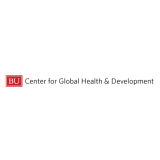
The Center for Global Health & Development (CGHD) at Boston University is a multidisciplinary research center that engages faculty from across the University to help solve the critical global health and social development challenges of their time. The mission of the center is not only to conduct high-quality applied research, but also to advocate for the use of this research to improve the health of underserved populations around the world. Through their collaborative work with scientists worldwide, they also seek to strengthen individual and institutional capacity to conduct and utilize research.
Over 90 employees and field staff are engaged in center-based research activities in more than 20 countries. They include clinical scientists trained in infectious diseases, internal medicine, and pediatrics; epidemiologists and demographers trained in the core public health disciplines; social scientists ranging from economists and lawyers to medical anthropologists; as well as a diverse range of experts from other professions.
Led by Professor Jonathon Simon, the CGHD currently focuses its research efforts on the following interrelated health and development concerns:
-HIV/AIDS
-Neonatal & Child Survival
-Pharmaceutical Access, Innovation & Use
-Health Systems Strengthening & Financing
-Poverty & Development
-Sex, Sexuality, Gender, and Health
In the future, the center plans to continue to build a portfolio of research that matches the educational strengths of the Boston University School of Public Health while expanding into new areas, including urban health and disabilities. The CGHD is also increasing its collaborations with faculty from across the many schools and colleges of Boston University who are interested in improving global health.
HIV/AIDS
The global HIV/AIDS epidemic is one of the worst public health disasters in recorded history. It is also a social and economic crisis. In the hardest-hit countries of Africa, decades of progress in social and economic development have been reversed by the epidemic. Other countries are struggling to implement and sustain effective responses that meet their populations’ needs.
For over 10 years, the Boston University Center for Global Health & Development (CGHD) has undertaken applied research and evaluation activities to help address the HIV/AIDS epidemic. The CGHD brings together expertise in economics, infectious diseases, public health, demography, epidemiology, and anthropology in an effort to understand how the AIDS epidemic affects households, businesses, government agencies, and other institutions in the developing world and to identify and evaluate policies and programs to mitigate the impact of AIDS. As with other CGHD programs, their goal in this program is to generate and disseminate practical, relevant information that is analytically rigorous and can be put to immediate use by program managers, policy makers, funding agencies, and other stakeholders.
Neonatal & Child Survival
Worldwide, 10 million children under the age of five die each year. One of the CGHD’s primary goals is to reduce the number of children who die from infectious diseases by undertaking high-impact, low-cost applied research that takes into account the interdependence of health and development.
Pharmaceutical Innovation, Access & Use
Policies for treating particular illnesses with appropriate drugs do not immediately translate into improved access to those drugs for affected populations. There may be a disincentive to create new medicines for certain diseases because a ‘market’ is lacking. There may be trade and intellectual property barriers to access. Distribution channels may lag behind policy protocol so that medications are understocked at pharmacies—particularly in remote regions—or are too expensive for the people for whom they are intended. Corruption in the pharmaceutical sector and counterfeit medicines may hamper efforts to provide quality-assured medicines. In addition, people may be reluctant to take various drugs for a variety of reasons, including economic constraints, cultural taboos, and lack of information. Finally, sometimes available drugs are taken when they shouldn’t be because of lack of understanding about the conditions for which they are appropriate. The CGHD’s research aims to improve understanding of these gaps between policy and practice and recommend actions to address them. CGHD researchers also participate in the BU School of Public Health’s Pharmaceutical Assessment, Management and Policy (PAMP) program.
Health Systems Strengthening & Financing
One of the most significant barriers to obtaining adequate treatment for HIV/AIDS is the cost of treatment and subsequent lack of health insurance coverage for low-wage workers. Researchers at the CGHD have conducted studies which support private sector employers marketing new, less-expensive health insurance for low-wage employees. Studies carried out in Namibia suggest that, assuming a favorable cost/benefit ratio, comprehensive health insurance plans can be offered to the majority of workers in African industry.
Poverty & Development
Approximately 1.2 billion people in the world live in extreme poverty (on less than one dollar per day). Poverty creates ill health because it forces people to live in environments that make them sick—without adequate shelter, clean water, or sanitation. Furthermore, people in poor countries have less access to health services, especially those living in remote rural areas. The CGHD recognizes that to improve the health of populations and promote social development, one of the root causes of ill health—poverty—must be addressed.
Sex, Sexuality, Gender, and Health
Gender, sex, and sexuality are among the strongest forces affecting the health, well-being, and development status of young and adult women and men around the world. Biological sex affects a person’s risk of sex-linked health problems, including maternal mortality and morbidity and ovarian cancer in women, and prostate cancer in men. Gender norms and power dynamics influence individual vulnerabilities and opportunities and are structured by socio-cultural, political, and economic forces. Research at the CGHD aims not only to understand and address immediate behavioral risk factors, but also local and large-scale structural forces such as gender roles, poverty, and marginalization.
Related research at the CGHD includes:
-improving health and social services for women living with HIV/AIDS in Vietnam
-addressing gender-related stigma and discrimination against people living with HIV/AIDS
-reducing sexual vulnerability to HIV/AIDS among adolescents in Namibia and Ethiopia
-identifying gender-related barriers to health services, such as those for treatment of malaria in -Ghana
-understanding gender-related differences in responses to antiretroviral treatment in Kenya
